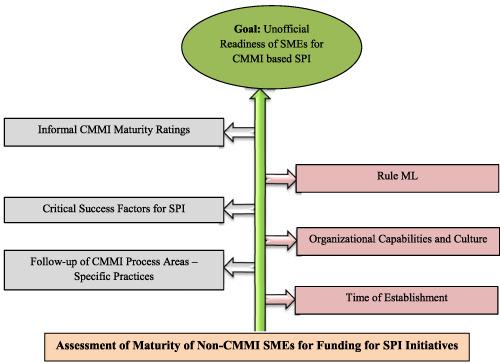当前位置:
X-MOL 学术
›
J. Softw. Evol. Process
›
论文详情
Our official English website, www.x-mol.net, welcomes your
feedback! (Note: you will need to create a separate account there.)
Measuring the maturity of Indian small and medium enterprises for unofficial readiness for capability maturity model integration-based software process improvement
Journal of Software: Evolution and Process ( IF 1.7 ) Pub Date : 2020-04-07 , DOI: 10.1002/smr.2261 Ashima Singh 1 , Sukhpal Singh Gill 2
Journal of Software: Evolution and Process ( IF 1.7 ) Pub Date : 2020-04-07 , DOI: 10.1002/smr.2261 Ashima Singh 1 , Sukhpal Singh Gill 2
Affiliation

|
Establishing the maturity levels of ‐ Small and Medium Enterprises (SMEs) without Capability Maturity Model Integration (CMMI) certification has always been regarded as an extremely challenging task. Software process improvement (SPI) has targeted to monitor and improve software processes, thereby improving the software business. Although there is scientific interest in SPI, little attention has been specifically given to the exploration of maturity levels for non‐CMMI SMEs. The goal is to explore the effect of time on process maturity and maturity levels achieved informally or unofficially by SMEs that are not otherwise CMMI certified. To find out the maturity levels achieved informally, a CMMI‐DEV v1.3 based survey questionnaire is administered to Indian software SMEs. Time of establishment of SMEs and follow‐up of CMMI‐based processes and practices unofficially are used as two important parameters to decide upon process maturity and achievement of specific CMMI level informally. This paper has been successful in ascertaining the effect of time of establishment of SMEs and follow‐up of CMMI‐based processes on process maturity using proposed RuleML that advocates adoption of more than 70% of CMMI‐DEV v1.3 process area‐specific practices for an SME to be unofficially ready for CMMI‐based SPI initiatives. The findings manifest multidimensional aspects of unofficial readiness of SMEs for CMMI‐based SPI that can be used by relevant authorities to select SMEs for funding for SPI initiatives. Finally, the proposed work has been validated statistically using t‐test for CMMI Level II and Level III.
中文翻译:

衡量印度中小企业对基于能力成熟度模型集成的软件过程改进的非正式准备的成熟度
建立没有能力成熟度模型集成(CMMI)认证的中小企业(SME)的成熟度水平一直被认为是一项极具挑战性的任务。软件过程改进 (SPI) 的目标是监控和改进软件过程,从而改进软件业务。尽管对 SPI 有科学兴趣,但很少有人特别关注非 CMMI SME 成熟度水平的探索。目标是探索时间对流程成熟度和成熟度水平的影响,这些成熟度水平由未经 CMMI 认证的 SME 非正式或非正式实现。为了找出非正式达到的成熟度水平,对印度软件中小企业进行了基于 CMMI-DEV v1.3 的调查问卷。中小企业的建立时间和基于 CMMI 的流程和实践的非正式跟进被用作两个重要参数,以非正式地决定流程成熟度和特定 CMMI 级别的实现。本文使用提议的 RuleML 成功地确定了 SME 的成立时间和基于 CMMI 的过程的后续过程对过程成熟度的影响,该规则提倡采用超过 70% 的 CMMI-DEV v1.3 过程领域特定实践让中小企业为基于 CMMI 的 SPI 计划非正式地做好准备。调查结果显示了中小企业对基于 CMMI 的 SPI 的非官方准备的多方面方面,相关当局可以使用它来选择中小企业为 SPI 计划提供资金。最后,所提出的工作已使用 CMMI Level II 和 Level III 的 t 检验进行了统计验证。
更新日期:2020-04-07
中文翻译:

衡量印度中小企业对基于能力成熟度模型集成的软件过程改进的非正式准备的成熟度
建立没有能力成熟度模型集成(CMMI)认证的中小企业(SME)的成熟度水平一直被认为是一项极具挑战性的任务。软件过程改进 (SPI) 的目标是监控和改进软件过程,从而改进软件业务。尽管对 SPI 有科学兴趣,但很少有人特别关注非 CMMI SME 成熟度水平的探索。目标是探索时间对流程成熟度和成熟度水平的影响,这些成熟度水平由未经 CMMI 认证的 SME 非正式或非正式实现。为了找出非正式达到的成熟度水平,对印度软件中小企业进行了基于 CMMI-DEV v1.3 的调查问卷。中小企业的建立时间和基于 CMMI 的流程和实践的非正式跟进被用作两个重要参数,以非正式地决定流程成熟度和特定 CMMI 级别的实现。本文使用提议的 RuleML 成功地确定了 SME 的成立时间和基于 CMMI 的过程的后续过程对过程成熟度的影响,该规则提倡采用超过 70% 的 CMMI-DEV v1.3 过程领域特定实践让中小企业为基于 CMMI 的 SPI 计划非正式地做好准备。调查结果显示了中小企业对基于 CMMI 的 SPI 的非官方准备的多方面方面,相关当局可以使用它来选择中小企业为 SPI 计划提供资金。最后,所提出的工作已使用 CMMI Level II 和 Level III 的 t 检验进行了统计验证。











































 京公网安备 11010802027423号
京公网安备 11010802027423号